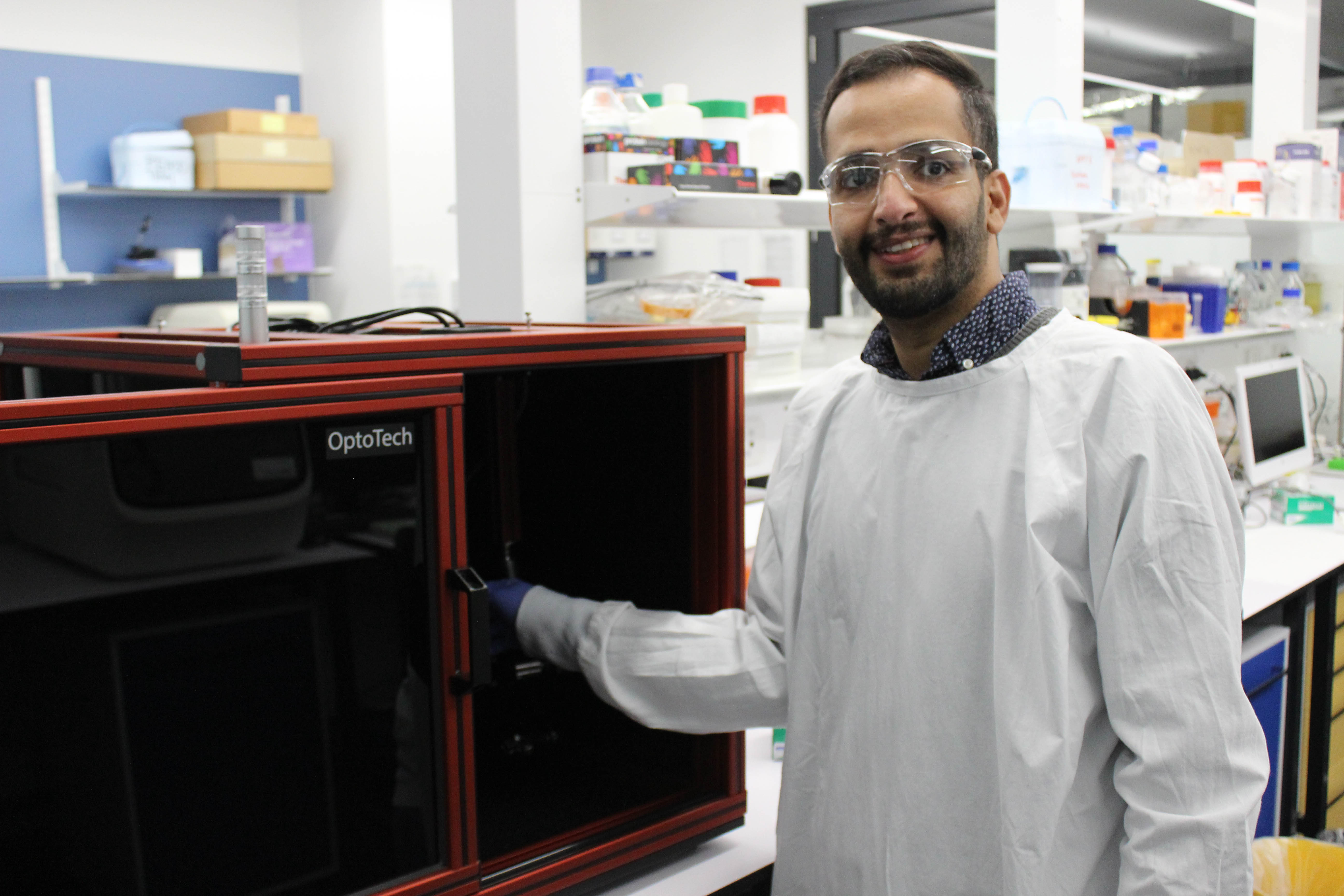Intern helps bring lasers to labs

PhD student, Ahmed Refaat, and the portable laser enclosure he developed during his internship
In summary
- Swinburne PhD student, Ahmed Refaat, was offered an internship with photonic specialists, OptoTech, because of his research on laser treatments for thrombosis
- During the internship he developed a portable laser enclosure to make laser experiments safer and more accessible for use in medical facilities
- The internship also gave him valuable experience in working with, and within, industry
Using lasers to perform eye surgery once sounded like something out of a science fiction novel. Now, such procedures are seen as commonplace.
However, even with the use of lasers well-established in medical practice, the true potential of such technologies is only beginning to be realised.
Swinburne PhD student, Ahmed Refaat, knows this to be true. He’s studied how tissue-penetrating lasers can be used to treat thrombosis. And he’s not the only one to see how lasers could improve medical research.
An internship that makes a difference beyond the student
Leaders in laser instrumentation solutions, OptoTech, offered Refaat an internship to explore how their technology could better help people doing research like his own. It gave him the opportunity to work with engineers and other commercial professionals to develop a design.
Laser experimentation is currently limited by safety constraints. Lasers need infrastructure which is rarely available at institutes doing medical research. Having a portable, safe, and easy-to-use set-up would fill this gap. By creating it, Refaat would allow more medical researchers to explore the potential of laser technologies.
Refaat used his own research needs to test and develop the enclosure setting, but it can be adapted to the needs of other researchers too. Neural stimulation or laser-based cancer treatments are two potential uses Refaat had in mind.
An experience with lasting impact
As well as developing the enclosure setting itself, the internship gave Refaat a chance to learn how to speak industry’s language and think about new solutions to the unmet problems in the healthcare field.
His experience working with OptoTech led him to a greater understanding of how industry works and can be used for positive impact.
“Now I know how to approach people in industry – stakeholders – and try to engage them in my research,” says Refaat.
“It's great to have a focus on fundamental science, but there is an urgent need to try to involve industry and translate the research into a final product in healthcare. We say: To take it from bench to bedside. That’s the main focus – how to do research with a real impact on the community.”
The cross-disciplinary nature of the internship also provided the opportunity for collaborative development. Refaat had the chance to work with, and be inspired by, people outside his own area.
“The engineers at Optotech were willing to share ideas for products and applications, which gives me new ideas. It makes me think, can I use the same idea in my field? That’s why it’s good to talk to people from different backgrounds,” he says.
Swinburne academics, Simon Moulton and Paul Stoddart, made the industry connection with OptoTech and the university financially support the laser enclosure cost. The internship is one of several hosted by Swinburne’s Medical Technology Victoria (MedTechVic). Other interns have worked across areas of engineering, design, health, biomedical science and more. The goal of these internships is to bring together academic and industry knowledge to spark new ideas and develop real-world solutions.
-
Media Enquiries
Related articles
-

- Technology
- Education
- Science
- University
New Australia-India joint research institute to advance energy, communications, materials and manufacturing technologies
Swinburne University of Technology and the Indian Institute of Technology Hyderabad (IITH) have launched the Swinburne-IITH Manufacturing, Materials, Energy and Communication Technologies (SIMMECT) Joint Research Institute, to drive impactful research and global collaboration on major technology challenges.
Monday 03 March 2025 -

- Health
- Science
Swinburne to boost AI-driven design for dental devices with investment in H3D
Swinburne has invested in spinout company H3D, a cutting-edge tech company that is reinventing custom-fit devices using AI and automation.
Monday 31 March 2025 -

- Science
- Sustainability
Swinburne joins global Green Steel Alliance to advance carbon-neutral ironmaking and steelmaking
Swinburne has become a founding member of the global Green Steel Alliance. The Green Steel Alliance brings together leading research and industry stakeholders from around the world to advance the transition to a green economy.
Wednesday 12 March 2025 -

- University
- Astronomy
- Science
‘Big Wheel’ disk galaxy discovered accidentally by international team
An international team involving Swinburne University of Technology has discovered a giant spiral disk galaxy in the early cosmos.
Tuesday 18 March 2025 -

- Health
- Science
Swinburne to advance cardiac care and asbestos detection with industry-engaged grants
Swinburne has secured two grants from Australia's Economic Accelerator Ignite program to support innovative commercialisation projects.
Wednesday 12 March 2025

